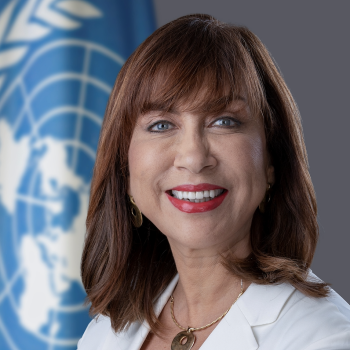Addressing humanitarian emergencies while keeping Sri Lanka on track in their sustainable development path
*This Resident Coordinator performed functions in Sri Lanka from 2018 to 2022.
Sri Lanka plunged into economic distress after it defaulted on its debt in May 2022 for the first time in the country’s history. This has left the population, especially the most vulnerable, deeply affected by many intersecting crises, including the impact of the COVID-19 pandemic, record high inflation, power shortages, and a crippling fuel crisis.
Following the Prime Minister’s request to the UN Resident Coordinator for international assistance, the UN in Sri Lanka, under the leadership of Resident Coordinator Hanaa Singer, immediately set forth to extend the necessary support to the most affected and furthest left behind groups.
- The Sri Lanka’s Humanitarian Needs and Priorities Plan, developed only within three weeks of the Prime Minister’s request, mobilized the UN Office for Humanitarian Affairs (OCHA), UN agencies, development partners, humanitarian actors and international financial institutions, under joint leadership by the Resident Coordinator’s Office. By October 2022, the UN reached more than a million of Sri Lanka’s most vulnerable people, including by providing 102,000 people with direct food assistance, distributing more than $2.2 million in cash assistance, and supporting more than 7,500 struggling farmers with agricultural inputs.
- The Resident Coordinator helped strengthened the UN Country Team’s engagement with the UN Economic and Social Commission for Asia and the Pacific (ESCAP) and with international financial institutions. As a result, the World Bank and the Asian Development Bank are now members of the UN Country Team, which facilitated the engagement of UN agencies with the World Bank’s Social Protection Global Practice to ensure a complementary service offer to the Government. The World Food Programme (WFP) and the Food and Agricultural Organization (FAO) have teamed up with the World Bank and the Asian Development Bank to procure emergency fertilizer and seeds for the Sri Lanka’s September planting season. The World Health Organization (WHO) has also worked with financial institutions to procure key pharmaceuticals. The UN Development Programme (UNDP), along with the technical support from ESCAP, has established a dedicated policy and research unit within the Finance Ministry to support macroeconomic stabilisation and debt sustainability.
Importantly, the Resident Coordinator helped to equip the UN country team with the capacities to mitigate the humanitarian impact of the crisis without creating permanent structures that would inhibit the return to a development driven paradigm. The development focus of the UN continues to be on addressing the root causes of the current instability and the people’s grievances.
This approach is very visible as the UN Country Team finalized together with the Government the priorities for UN’s support on sustainable development in the years to come, through the new UN Sustainable Development Cooperation Framework (2023-2027) – the roadmap for sustainable development between the UN and the Government.
Watch the video below from the Resident Coordinator to learn more about results in Sri Lanka.



